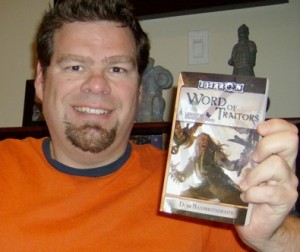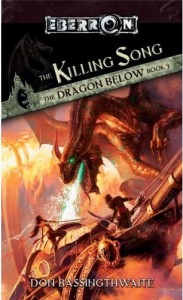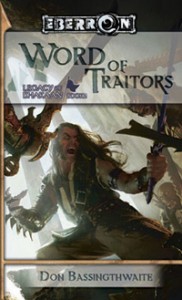
We continue our interview with Eberron author, Don Bassingthwaite. In this installment Don talks about how much D&D’s game rules impact his writing as well as some of the challenges he experienced when 4e came out.
Although the interview will be presented in print and in multiple parts, when we’re finished we’ll make the complete interview available as an audio download.
You can read all about Don and follow him at his own website DBassingthwaite.com. You can also visit the Don Bassingthwaite page at Wizards of the Coast. It has a mini bio as wells as a list of the Forgotten Realms and Eberron books he’s written. They also provide sample chapters of his recent works for download.
If you missed the first installment, be sure to check out An Inteview with Eberron author Don Bassingthwaite (Part 1).
Interview – Part 2
You’ve written for both Forgotten Realms and Eberron, do you have a preference? Or is it just I write whatever they tell me to write?
Partly it’s I write whatever they tell me to write. It’s a business. But that said I like Eberron better then Forgotten Realms because it’s got that sort of that dark fantasy, noir edge that Forgotten Realms doesn’t necessarily have. And it’s also a lot of fun being in on the ground floor. Forgotten Realms has a ton of lore behind it which is really fascinating, but it’s not the same as being right in there with Eberron and getting to create some of it.
Are you a gamer? Do you play D&D regularly?
I have not played for a long time, unfortunately. I don’t feel like I’ve got enough time to play any more for one thing. But through high school and university I was big into it. I loved it. And I’ve sort of carried on. I’ve never let the involvement with gaming lapse. For a while I was a gaming editor for Black Gate magazine. I love reading the stuff. That’s sort of where I’m with it right now. I haven’t had a chance to play for a while, but I sort of stay on top of what’s happening with everything.
Is your reason for not playing simply because you don’t have people to play with?
No, it’s more time and responsibility. There was a period about 10 years ago, when for about a year and a half I was back in with a group and we were back playing fairly regularly, but all of our schedules didn’t work. We just didn’t have time any more.
When you’re writing a D&D novel do you take into consideration what class and level the characters are? Or is this question somewhat irrelevant since you’re not actively playing D&D?
Not actively playing right now doesn’t make a difference, because I’ve got the gamer “head set.” Way back when, I co-wrote a book for White Wolf called As One Dead with horror writer Nancy Kilpatrick. She’d never actually played the role-playing games before so it was walking her through that sort of mind-set of how they work. But no, when I’m writing, you sort of have to keep the rules in mind. I tell people “You have to keep them in mind, but you want them to be invisible.” It’s like writing for the real world except instead of using a tour book as your source of information you’ve got a game set and these are the rules about how that world works. You don’t want people to see it.
So yes, I think of my characters in terms of “this is the class they are” and “this is the race they are” and “this is approximately the level they are” and that dictates what they can do. You sort of have to play fast and loose with that because the rules are meant for the players, not the characters. If I need a character to do a particular thing and it’s reasonably within the bounds of what they can do I’m going to say “Yeah, they can do that.” And then if I have to, later I’ll figure out “Ok, this is the rule that lets them do that” or I’ll just say “Nah” and fudge it a little bit.
So what you’re saying is that you’d never restrict the actions of a character just because the rules say you can’t do it.
That’s right. When it comes to the whole level thing, you sort of have to think of them more as people then as batches of numbers. So if a whole pack of goblins comes after a character who’s killed a dragon and it’s like “Ok this shouldn’t be that difficult.” It’s like “He’s killed a dragon before so he can take on goblins.” But the goblins still have to be a threat. So there’s a lot of fudging there. You have to think of it in terms of what’s going on right in that scene that makes these goblins a threat. There’s a lot of them and he can only fight so many at a time, so no matter what the rules say he could do about it you sort of scale that back and you play in the scene.
If my PCs are the heroes in a points-of-light D&D setting, how do you see them in relationship to the heroes from the novels? Do you see the characters from the novels as the heroes to my heroes?
One of the things about Eberron is that if you read the foreword, you get the sense of what the game is about. They’ve always emphasized that your characters are the heroes of the world. And that’s why, unlike the Forgotten Realms, there aren’t a lot of really high level NPCs running around. And the way I tend to think of the books is these are the heroes of my campaign.
So I wouldn’t necessarily say that my heroes are the heroes to your heroes. They could be, if you want to use them in your setting they could be that. They could be the people stories are told about. I call them “my heroes” and that’s how they sort of fit within the framework.
Recent updates to the Character Builder have included character sheets for some of Wizards of the Coast’s most popular heroes. If they were to stat out the characters from your novels, how much input would you have in that process?
 No one’s come to me yet for that. I suspect they would come to me because I’ve got it in my head that this is how the breakdown works. They would probably come to me and say “what’s the general information?” I like to think that the way I write is in game terms of what the characters are or what they’re doing.
No one’s come to me yet for that. I suspect they would come to me because I’ve got it in my head that this is how the breakdown works. They would probably come to me and say “what’s the general information?” I like to think that the way I write is in game terms of what the characters are or what they’re doing.
My personal example is the character Singe from the Dragon Below trilogy who is essentially a fire Wizard. He uses a lot of spells that seem fairly similar if you don’t know what they are. It’s like he’s throwing fire around here and there. And I can say, “Well no, at this point he’s using scorching ray, burning hands or fireball” and all that sort of thing. I don’t come out and say that, but maybe I describe the effect a little bit differently. Mostly they all look fairly similar and that’s just what they are. So it doesn’t really give you a hint of level as such.
So essentially someone who doesn’t know the game can just enjoy the book and someone who does know the game can say “Oh, he’s doing that.” I do have in my head what the characters are. It’s just that no one’s asked me. I generally don’t like to stat them out myself, or at least publish stats for them anyway, because it limits what you can do in the book. Like if you say “this” then you’ve nailed it down. And if you want to shift things a bit it’s harder to do it later.
How has the transition from 3.5 to 4e affected your characters?
 The transition from 3.5 to 4e just completely changes how you conceptualize the characters. Under the 4e rules they can’t do certain things any more. The Bard is a pretty good example. I’ve established what the character can do in this sequence and it’s like “She can’t really do that any more.” Word of Traitors was affected to a lesser extent because it was pretty much done by the time 4e came out. “I can’t change it now, it’s done.” But for The Tyranny of Ghosts, the third book in the Legacy of Dhakaan trilogy, it’s unfortunately this bizarre blend of 3.5 and 4e rules. If you’re looking at things you say “Ok, this character is doing something that is distinctly a 4e power, but this character is doing something that’s kind of 3.5” and it’s a real hodge-podge.
The transition from 3.5 to 4e just completely changes how you conceptualize the characters. Under the 4e rules they can’t do certain things any more. The Bard is a pretty good example. I’ve established what the character can do in this sequence and it’s like “She can’t really do that any more.” Word of Traitors was affected to a lesser extent because it was pretty much done by the time 4e came out. “I can’t change it now, it’s done.” But for The Tyranny of Ghosts, the third book in the Legacy of Dhakaan trilogy, it’s unfortunately this bizarre blend of 3.5 and 4e rules. If you’re looking at things you say “Ok, this character is doing something that is distinctly a 4e power, but this character is doing something that’s kind of 3.5” and it’s a real hodge-podge.
So for the whole thing I was just going with the concept “Let the story take prescience.” And next time, whatever I write for Wizards of the Coast, I want to do it in just 4e. Those are the rules I want to use and it’s going to change how I write because you want the book product to reflect the game product. And there’s the twist. 4e has a different feel to me than 3.5.
It’s a hard transition to make. You want to include things like Tieflings and Eladrin but at the same time it’s hard to do it. I think writing for Eberron you’ve got an advantage over Forgotten Realms. Where Forgotten Realms the transition from 3.5 to 4e was a setting changer: the spell plague. With Eberron they didn’t advance the timeline with the new books they just sort of re-booted it. It stays the same event. So essentially, you could look at it and say, well Eladrins and Tieflings have always been there and now we’ll just start mentioning them a little bit. It’s a tricky thing to do.
Visit Dungeon’s Master next week when we continue with part 3 of our interview with author Don Bassingthwaite.
4 replies on “An Interview With Eberron Author Don Bassingthwaite (Part 2)”
[…] Dungeon’s Master next week when we continue with part 2 of our interview with author Don Bassingthwaite. Share and […]
[…] a while ago. They’ve got the text transcript up now — go over and have a read (part 1 | part 2 | part 3 coming […]
[…] If you missed the other installments, be sure to check out An Interview with Eberron author Don Bassingthwaite (Part 1) and (Part 2). […]
[…] to impact the Eberron setting and even who he’d cast in movie versions of his book (Part 1 | Part 2 | Part […]